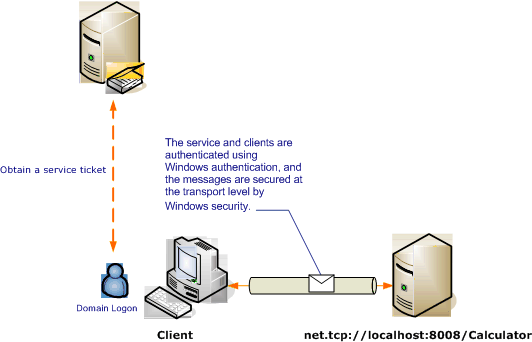トランスポート セキュリティと Windows 認証
次のシナリオは、Windows セキュリティで保護された Windows Communication Foundation (WCF) クライアントおよびサービスを示しています。 プログラミングの詳細については、「方法: Windows 資格情報を使用してサービスをセキュリティで保護する」を参照してください。
イントラネットの Web サービスでは人事情報を表示しています。 クライアントは Windows フォーム アプリケーションです。 このアプリケーションは、Kerberos コントローラーで保護されたドメインに展開されています。

| 特徴 | 説明 |
|---|---|
| セキュリティ モード | トランスポート |
| 相互運用性 | WCF のみ |
| 認証 (サーバー) 認証 (クライアント) |
○ (Windows 統合認証を使用) ○ (Windows 統合認証を使用) |
| 整合性 | はい |
| 機密性 | はい |
| トランスポート | NET.TCP |
| バインド | NetTcpBinding |
サービス
次のコードと構成は、別々に実行します。 次のいずれかの操作を行います。
構成を使用せずに、コードを使用してスタンドアロン サービスを作成します。
提供された構成を使用してサービスを作成しますが、エンドポイントを定義しません。
コード
次のコードは、Windows セキュリティを使用するサービス エンドポイントの作成方法を示します。
// Create the binding.
NetTcpBinding binding = new NetTcpBinding();
binding.Security.Mode = SecurityMode.Transport;
binding.Security.Transport.ClientCredentialType =
TcpClientCredentialType.Windows;
// Create the URI for the endpoint.
Uri netTcpUri = new Uri("net.tcp://localhost:8008/Calculator");
// Create the service host and add an endpoint.
ServiceHost myServiceHost = new ServiceHost(typeof(Calculator), netTcpUri);
myServiceHost.AddServiceEndpoint(typeof(ServiceModel.ICalculator), binding, "");
// Open the service.
myServiceHost.Open();
Console.WriteLine("Listening...");
Console.ReadLine();
// Close the service.
myServiceHost.Close();
' Create the binding.
Dim binding As New NetTcpBinding()
binding.Security.Mode = SecurityMode.Transport
binding.Security.Transport.ClientCredentialType = TcpClientCredentialType.Windows
' Create the URI for the endpoint.
Dim netTcpUri As New Uri("net.tcp://localhost:8008/Calculator")
' Create the service host and add an endpoint.
Dim myServiceHost As New ServiceHost(GetType(ServiceModel.Calculator), netTcpUri)
myServiceHost.AddServiceEndpoint(GetType(ServiceModel.ICalculator), binding, "")
' Open the service.
myServiceHost.Open()
Console.WriteLine("Listening...")
Console.ReadLine()
' Close the service.
myServiceHost.Close()
構成
コードの代わりに次の構成を使用して、サービス エンドポイントをセットアップできます。
<?xml version="1.0" encoding="utf-8"?>
<configuration>
<system.serviceModel>
<behaviors />
<services>
<service behaviorConfiguration="" name="ServiceModel.Calculator">
<endpoint address="net.tcp://localhost:8008/Calculator"
binding="netTcpBinding"
bindingConfiguration="WindowsClientOverTcp"
name="WindowsClientOverTcp"
contract="ServiceModel.ICalculator" />
</service>
</services>
<bindings>
<netTcpBinding>
<binding name="WindowsClientOverTcp">
<security mode="Transport">
<transport clientCredentialType="Windows" />
</security>
</binding>
</netTcpBinding>
</bindings>
<client />
</system.serviceModel>
</configuration>
Client
次のコードと構成は、別々に実行します。 次のいずれかの操作を行います。
コード (およびクライアント コード) を使用してスタンドアロン クライアントを作成します。
エンドポイント アドレスを定義しないクライアントを作成します。 代わりに、引数として構成名を受け取るクライアント コンストラクターを使用します。 次に例を示します。
CalculatorClient cc = new CalculatorClient("EndpointConfigurationName");Dim cc As New CalculatorClient("EndpointConfigurationName")
コード
クライアントを作成する場合のコード例を次に示します。 バインディングは、クライアントの資格情報の種類が Windows に設定された、TCP トランスポートによるトランスポート モード セキュリティを使用するように構成されます。
// Create the binding.
NetTcpBinding myBinding = new NetTcpBinding();
myBinding.Security.Mode = SecurityMode.Transport;
myBinding.Security.Transport.ClientCredentialType =
TcpClientCredentialType.Windows;
// Create the endpoint address.
EndpointAddress myEndpointAddress = new
EndpointAddress("net.tcp://localhost:8008/Calculator");
// Create the client. The code for the calculator client
// is not shown here. See the sample applications
// for examples of the calculator code.
CalculatorClient cc =
new CalculatorClient(myBinding, myEndpointAddress);
try
{
cc.Open();
// Begin using the client.
Console.WriteLine(cc.Add(100, 11));
Console.ReadLine();
// Close the client.
cc.Close();
}
' Create the binding.
Dim myBinding As New NetTcpBinding()
myBinding.Security.Mode = SecurityMode.Transport
myBinding.Security.Transport.ClientCredentialType = TcpClientCredentialType.Windows
' Create the endpoint address.
Dim myEndpointAddress As New EndpointAddress("net.tcp://localhost:8008/Calculator")
' Create the client. The code for the calculator client
' is not shown here. See the sample applications
' for examples of the calculator code.
Dim cc As New CalculatorClient(myBinding, myEndpointAddress)
cc.Open()
' Begin using the client.
Try
cc.Open()
Console.WriteLine(cc.Add(100, 11))
Console.ReadLine()
' Close the client.
cc.Close()
Catch tex As TimeoutException
Console.WriteLine(tex.Message)
cc.Abort()
Catch cex As CommunicationException
Console.WriteLine(cex.Message)
cc.Abort()
Finally
Console.WriteLine("Closed the client")
Console.ReadLine()
End Try
構成
コードの代わりに次の構成を使用して、クライアントを作成できます。
<?xml version="1.0" encoding="utf-8"?>
<configuration>
<system.serviceModel>
<bindings>
<netTcpBinding>
<binding name="NetTcpBinding_ICalculator" >
<security mode="Transport">
<transport clientCredentialType="Windows" />
</security>
</binding>
</netTcpBinding>
</bindings>
<client>
<endpoint address="net.tcp://localhost:8008/Calculator"
binding="netTcpBinding"
bindingConfiguration="NetTcpBinding_ICalculator"
contract="ICalculator"
name="NetTcpBinding_ICalculator">
</endpoint>
</client>
</system.serviceModel>
</configuration>